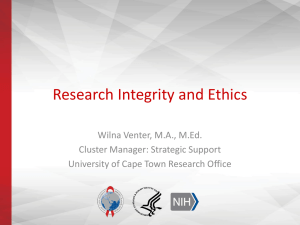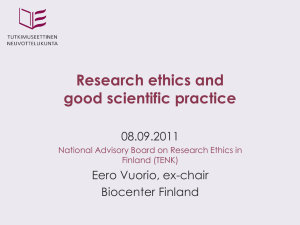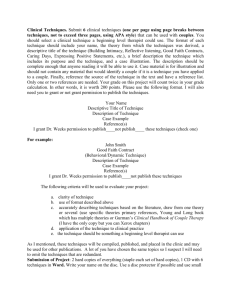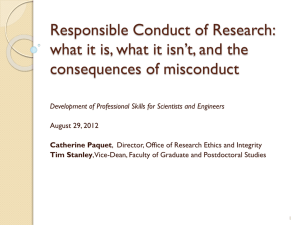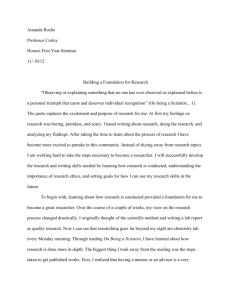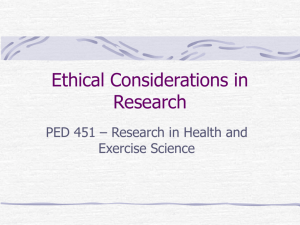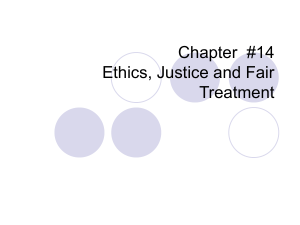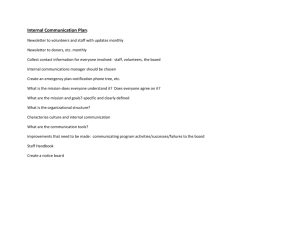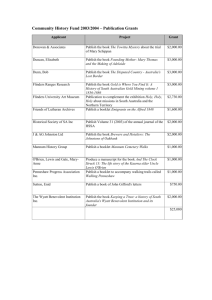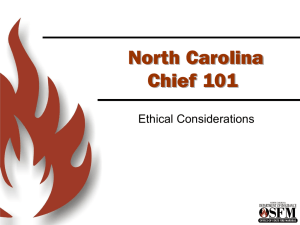Good Research Practice - NOT
advertisement
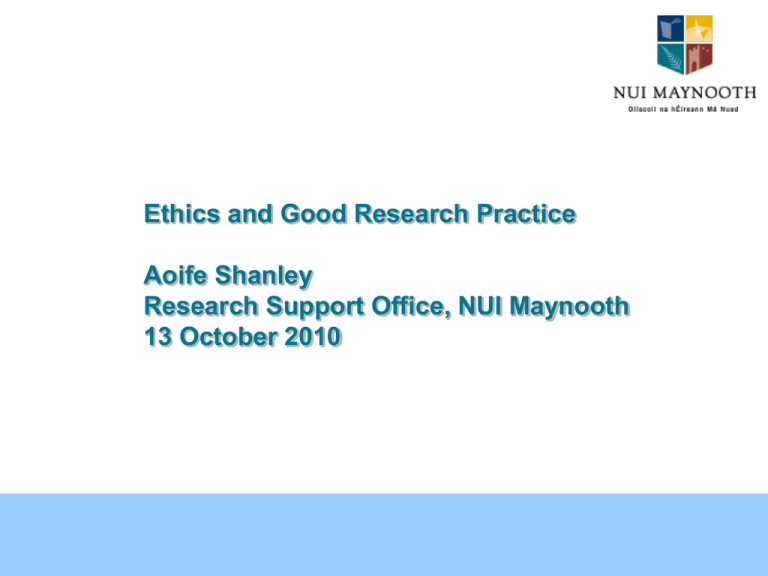
Ethics and Good Research Practice Aoife Shanley Research Support Office, NUI Maynooth 13 October 2010 Ethics • Define Ethics - ‘A code of behaviour considered correct, especially that of a particular group or profession’ (Collins concise dictionary) • Main Principle • High Standard of integrity in Research • Conform with University Policies Ethics Procedures • Procedures - When do I need Ethical Approval? • Research involving Humans • Research involving Human Derived Material • Research involving animals • Research involving Genetically Modified Organisms • Research involving BioHarzardous Agents Principles of Ethics • Principles • Integrity/Good practice • Academic Freedom • Data storage and retention • Confidentiality • Publications/authorship • Conflict of Interest • Misconduct in research What is Good Research Practice? The way in which research is: • Planned and conducted • Results are recorded and reported • Discoveries are disseminated, applied, and exploited • GRP is everyone’s responsibility • Meet with your mentor regularly – insist upon it! • Record your data and keep a notebook (paper or electronic) Academic Freedom in Research • A commitment to academic freedom is essential to a University • By pursuing truth and its free expression, scholars and researchers advance and disseminate knowledge With this power comes great responsibility… • To act in accord with the highest standards of integrity Research Integrity Requires: • The highest professional standards • A critical, open-minded approach • Frankness and fairness • Absolute honesty • Avoiding: • Fraud • Piracy or plagiarism • Sabotaging work, records or protocols • Breach of confidence Data storage and Retention • Store in a way that permits ready paper or electronic verification, with back-up • Original data should be authenticated, to protect against allegations of falsification of data • Under the Freedom of Information Act 1993, any University is required to allow access to documents which are in the University’s possession under defined circumstances • Data should be held for at least 5 years from the date of publication Confidentiality • If you have access to another researcher’s work, you must get permission before discussing details or ideas with another party • Research subjects are entitled to confidential treatment of all information that they give – Don’t blab! • Confidentiality is important where there is potential for commercial exploitation Authorship • Publication of research results and other scholarly work is an intrinsic part of research • Authorship should be granted to individuals who have made a major contribution to the work and who are familiar with the entire contents • Authors should have participated sufficiently in the research to take public responsibility for the content • Other contributions to the work and financial support from sponsors should be acknowledged formally Publication • Do report results • Do publish data in a timely fashion • Do not exaggerate the importance of results • Do not publish without permission • Do not publish the same data more than once • Do not report results in the public media before reporting to a research audience of experts Conflict of Interest Conflicts can be: • Financial • Personal • Academic • Political • Conflicts of interest can occur at every stage and in many forms • Ask yourself: “Do I feel even vaguely funny about what I’m doing and am I motivated by some other agenda?“ • If the answer is “Yes”, then you must declare your conflict to your employer, peer-review body (e.g. funding agency) or journal Play the CoI Game! 1) You’ve been sent a grant to review from a close competitor and the grant is on something that you’re also trying to get funded. Is this a conflict? What should you do? 2) You’ve been sent a paper to review from a person who stole your boy/girlfriend sometime in the past. You hate the person’s guts, but have to admit that s/he is an excellent researcher and you respect her/his work. Is this a conflict? What should you do? 3) You’ve been sent a paper to review from a person who stole your boy/girlfriend sometime in the past. You hate the person’s guts, but have to admit that s/he is an excellent researcher and you’ve have been hell-bent on destroying him/her ever since s/he did you wrong. Is this a conflict? What should you do? Misconduct in Research • ‘Fabrication, falsification, or plagiarism in proposing, performing, or rewiewing research, or in reporting results’ (US Office of Research Integrity [ORI]) • Failure to follow established protocols • Sabotage of research-related property of another researcher • Does not include honest error or honest differences, or poor research unless this encompasses the intention to deceive In summary: • Be a good academic citizen • Know what you’re doing • Keep track of what you’ve done • Back everything up • Don’t lie or cheat or blab • Publish your discoveries Good Research Practice - NOT Professor Marc Hauser, Dept of Psychology, Harvard – August 2010 • Data falsification – responses of tamarin monkeys • 8 instances of research misconduct – 3 publications to be retracted or corrected Good Research Practice - NOT The Hitler Diaries •“Discovered” by journalist Gerd Heidemann •April 1983, Stern magazine paid ~€5M to publish extracts •Authenticated by historians Hugh Trevor-Roper, Eberhard Jäckel and Gerhard Weinberg •Trevor-Roper was a Times Newspapers Director, which had paid a lot of money to publish extracts – Clear CoI!!! •Diaries revealed as "grotesquely superficial fakes" made with modern paper and ink, and full of historical inaccuracies •Stern editors resigned, Trevor-Roper’s reputation damaged seriously, Heidemann and forger Konrad Kujau sentenced to 42 months in prison Good Research Practice - NOT •Ethical Violations: Female lab members had to donate eggs •Misconduct: Data was faked and used in more than one publication •Hwang claimed ignorance “artificial mistakes” – Not good enough!!
